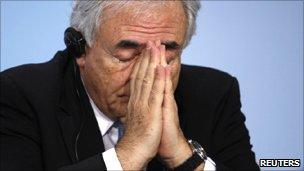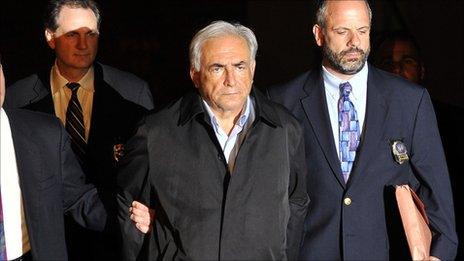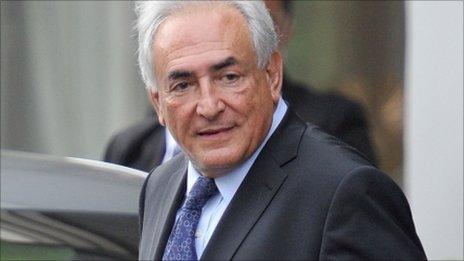Who, What, Why: Does Strauss-Kahn have immunity?
- Published

International Monetary Fund chief Dominique Strauss-Kahn has been charged in the US with a criminal sexual act, attempted rape and unlawful imprisonment. But could the Frenchman claim diplomatic immunity?
Diplomats have had immunity from prosecution in their host country for centuries - meaning they cannot be arrested or prosecuted for any offences they commit, from minor parking violations to serious crimes of violence.
This immunity, spelt out in the 1961 Vienna Convention on Diplomatic Relations, applies both when they are carrying out their official duties, and when they are off-duty.
As the head of one of the UN's specialised agencies, the IMF managing director is just as immune from prosecution as any diplomat, says Jovan Kurbalija, director of DiploFoundation, a Geneva-based organisation researching the role of diplomacy in the modern age.
Furthermore, unlike a diplomat - who is immune from prosecution only in the country where he or she is based - the head of a UN agency is immune from prosecution in all countries.
There is a big difference between the head of the IMF, and its rank-and-file members, who are immune from prosecution only with regard to "acts performed... in their official capacity".
Mr Kurbalija says the principle establishing immunity from prosecution for the heads of UN agencies is laid down in article six of the 1947 Convention on the Privileges and Immunities of the Specialized Agencies.
This states: "The executive head of each specialised agency... shall be accorded... the privileges and immunities, exemptions and facilities accorded to diplomatic envoys, in accordance with international law."
"The general principle is that heads of international organisations have full diplomatic immunity," Mr Kurbalija says.
Waiving immunity
Sometimes when a diplomat is accused of a serious offence, his or her government will waive immunity, allowing a prosecution to go ahead.
Mr Kurbalija says that Mr Strauss-Kahn has tacitly waived his own immunity, by submitting to forensic tests and stating his intention to fight the case.
Formally, the decision to waive Mr Strauss-Kahn's immunity rests with the IMF itself, he says, not with Mr Strauss-Kahn as an individual.
"An individual cannot waive his or her immunity - but if he decides to waive his immunity, it will be just a formality [to waive it] from the IMF," Mr Kurbalija says.
But Mr Strauss-Kahn could choose to invoke his diplomatic immunity in future, he says - and this could confront the IMF with a more difficult decision.
The IMF has so far given no clue about its position on the question.
Although Mr Strauss-Kahn was visited on Saturday by the French consul general, an unnamed French official also told Le Monde that any immunity was a matter for the IMF and the US. "To me, there is no immunity," the official said. "His Frenchness is not at stake."
Mr Strauss-Kahn's apparent decision to fight the case echoes an earlier episode where he chose to tackle a legal problem head-on.
In 1999, he resigned as France's minister of economy and finance, to focus on his defence against an accusation that he backdated documents to justify his consultancy fees for work on a student health insurance fund.
He was acquitted in 2001.
- Published16 May 2011

- Published16 May 2011
- Published12 June 2015
